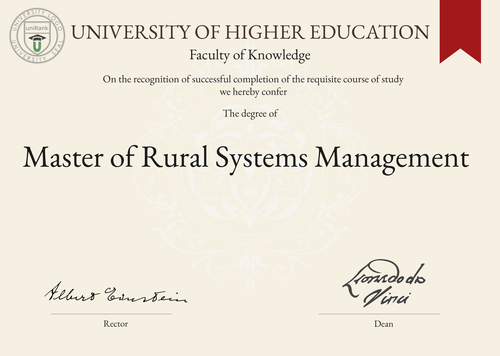
Master of Rural Systems Management (M.R.S.M.)
Guide to Master of Rural Systems Management Program/Course/Degree
Master of Rural Systems Management (M.R.S.M.)

Program Name
Master of Rural Systems ManagementProgram or Degree abbreviation
M.R.S.M.Duration range
The duration of the program typically ranges from 1 to 2 years.Tuition range
The tuition fees for the program can vary depending on the chosen country or university. Please refer to the respective university's website for specific information.Overview
The Master of Rural Systems Management program is designed to provide students with a comprehensive understanding of managing rural systems and developing sustainable solutions for rural communities. It combines theoretical knowledge with practical skills to equip graduates with the necessary expertise to address the unique challenges faced in rural areas.Curriculum Overview by year
Year 1: - Introduction to Rural Systems Management - Rural Development Strategies - Agricultural Economics - Rural Policy and Governance - Research Methods in Rural Systems Management Year 2: - Sustainable Agriculture and Food Systems - Rural Entrepreneurship and Innovation - Natural Resource Management - Rural Marketing and Supply Chain Management - Capstone ProjectKey Components
The key components of the Master of Rural Systems Management program include: - Understanding rural systems and their complexities - Developing sustainable solutions for rural development - Analyzing rural policies and governance structures - Applying entrepreneurship and innovation in rural contexts - Managing natural resources in a sustainable mannerCareer Prospects
Graduates of the program can pursue various career paths in both public and private sectors. Potential career prospects include: - Rural development specialist - Agricultural project manager - Policy analyst - Sustainable agriculture consultant - Rural marketing managerSalary Expectations
Salary expectations for graduates of the Master of Rural Systems Management program can vary depending on factors such as location, industry and job position. It is recommended to research specific salary information for the desired career path and region. For a more accurate understanding of salary expectations, you can utilize the Job Sites Search Engine, from our sister site jobRank, which searches over 4,600 job sites worldwide. Make sure to specify not only the job title but also the country you are interested in.Conclusions:
The duration, tuition fees, curriculum, key components, career prospects and salary expectations of the Master of Rural Systems Management program can vary based on the chosen country or location for studying the program, as well as the chosen university. Prospective students are advised to explore different universities and countries to find the best fit for their academic and career goals. Visitors can search for where this specific degree, Master of Rural Systems Management, is offered anywhere in the world through the uniRank World Universities Search Engine.World Universities Search Engine
search for Master of Rural Systems Management (M.R.S.M.) and add the Location (country, state etc.) or specific University you are interested in studying at.
Query examples:
- Master of Rural Systems Management (M.R.S.M.) United States
- Master of Rural Systems Management (M.R.S.M.) United Kingdom online
- Master of Rural Systems Management (M.R.S.M.) Australia international students
- Master of Rural Systems Management (M.R.S.M.) University of California
- Master of Rural Systems Management (M.R.S.M.) University of London tuition fees
- Master of Rural Systems Management (M.R.S.M.) University of Sydney scholarships
Share Program/Course
Interesting? Share this program/course/degree info with your friends now.